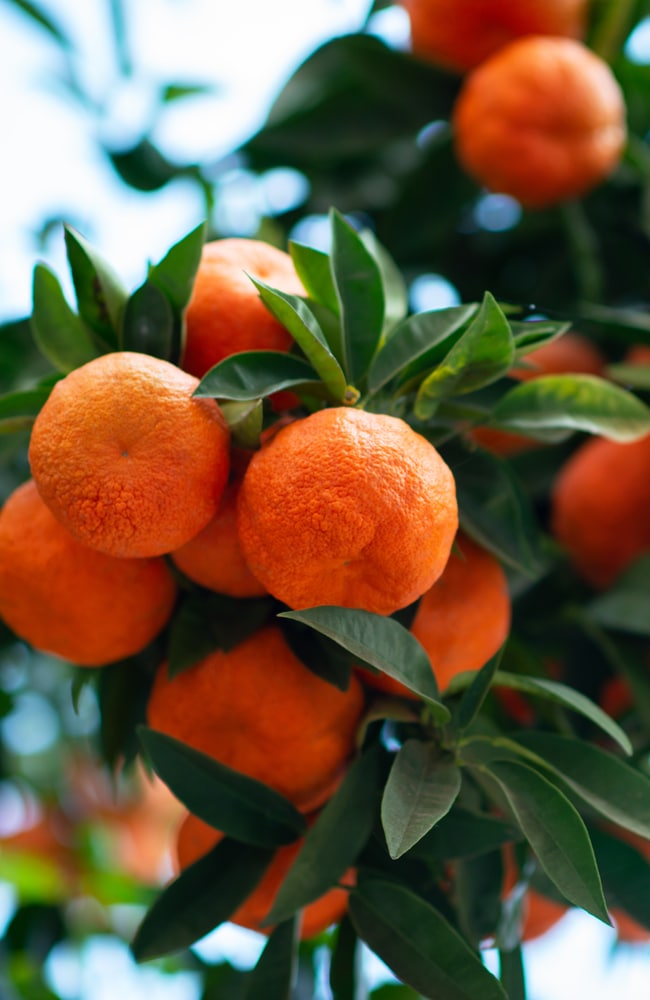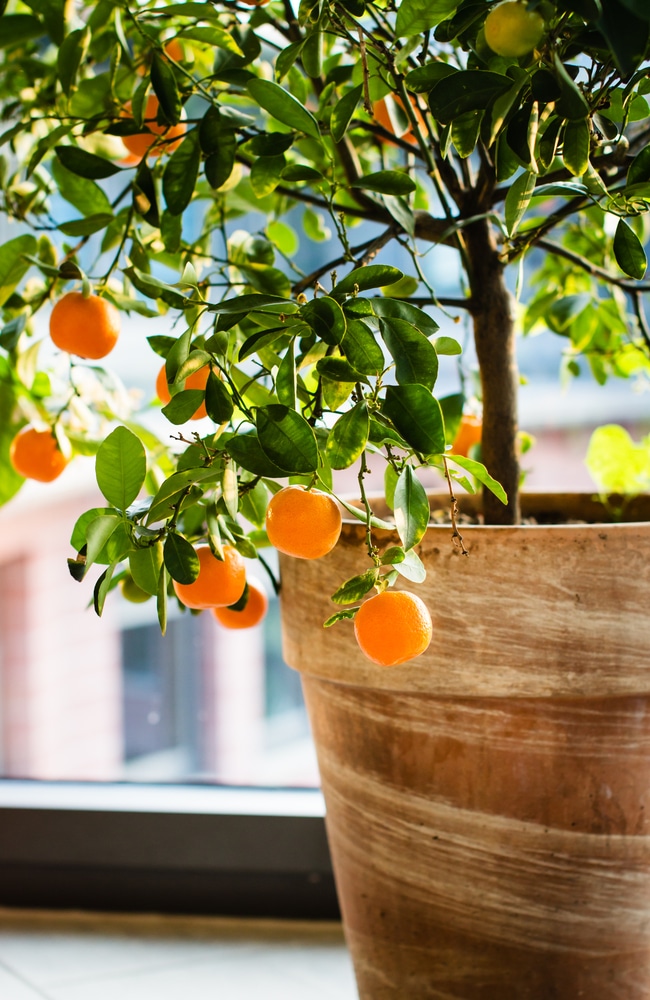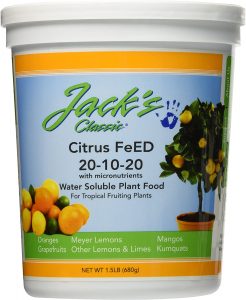Not all fertilizers are created equal. The difference between the best ones out there and an average one is drastic. It can mean the difference between healthy sweet fruit and small flavorless fruit
Keep reading below to find the top products that we recommend for you to use to fertilize citrus stress. Below our reviews, we also have a short citrus tree care guide to make sure you are successful!
Make sure to check out our other guides on growing fruits and vegetables. We have a wonderful guide on growing lemon trees.
Our Top Choices
At A Glance
- OUR TOP CHOICEDown to Earth Organic Fertilizer Mix
- J R Peters Fertilizer
- Epsoma Citrus-tone Plant Food
- EcoScraps Organic Gardening Plant Food
- Jobe’s Fruit Fertilizer Spikes
Here are our most recommended products. Make sure to keep reading below to find individual descriptions of each of them.
What’s So Important About Proper Nutrients?
Raising a citrus tree is not difficult, but it does take a lot of time. It takes time, patience, and the right gardening tools.
Citrus trees generally do not bear fruit until they are at least 3 years old. You will want to properly water and fertilize your tree so that it is healthy and has the maximal chance of bearing fruit during the growing season.
This broad category includes a whole range of different trees including lemon, orange, lime, and grapefruit trees.
Without the right nutrients, your tree may not bear fruit. And even if it does bear fruit, it might not be as sweet as it could be.
Choosing the right product can be difficult because there is so much marketing hype on labelling these days. Some products make false claims, which are hard to verify because you will not notice the downstream effects of the fertilizer you choose until months later.
Different products are composed of different ingredients and also contain different N-P-K ratios. The ones listed below are the ones that we recommend.

Product Reviews
Down to Earth Organic Fertilizer Mix
Down to Earth Organic Citrus Mix features a well-crafted blend of nutrients essential to fruit trees. It is completely natural and organic and does not include any harmful chemicals, growth stimulants, or synthetic materials. This makes the plant food not only an excellent choice for promoting growth, but it is also environmentally friendly. Gardeners who use Down to Earth will discover that their trees are healthier, produce more fruit, and have lusher, greener foliage.
J R Peters Fertilizer
J R Peter’s product is designed to help citrus trees flourish. It contains a balanced mix of the nutrients. The micronutrients within the plant food help to create stronger limbs and greener, fuller foliage. Trees treated with J R Peters also tend to produce more flowers and larger, more abundant fruit.
Epsoma Citrus-tone Plant Food
Gardeners can feel great about using Epsoma Citrus-tone Plant Food because it is organic and made from natural ingredients. This formula is designed specifically for fruit, citrus, and nut trees. The plant food contains a balance of essential nutrients as well as living microbes, which help keep the soil nourished and make it easier for trees to receive those nutrients. Epsoma plant food also features a slow-release formula, so trees are fed a continuous supply of nutrients for an extended period of time. Trees treated with Epsoma Citrus-tone Plant Food are healthier all around, which means they can produce larger, more abundant, and more flavorful fruit.

EcoScraps Organic Gardening Plant Food
EcoScraps Organic Gardening Citrus & Avocado Plant Food is specifically designed to suit the nutritional needs of fruit trees. It is all natural and organic, and the nutrient mix is crafted to deliver continuous, balanced nutrition. Because it is made from scraps, the making of this product helps to reduce waste and it does not contain any harmful products such as chicken waste. The fertilizer is granulated, so it can be sprinkled on in a single layer for even feeding. Gardeners who use it will find that their trees are healthier and stronger. Not only that, but trees will produce larger, healthier fruit that tastes amazing.
Jobe’s Fruit Fertilizer Spikes
Jobe’s Fruit Spikes are designed to deliver high quality nutrients directly to a plant’s roots. These spikes are pre-measured and formulated to enrich fruit trees, so gardeners can insert them near the dripline and rest assured that their plants are being fed. In addition, the spikes are low in odor, aren’t messy, and create much less runoff during rain or watering than other products. Fruit trees that have been fed with it will have stronger root systems and stronger overall health, which means they will be able to produce larger, juicier fruit in more abundance.

We also recommend that you check out our guide on how to make espalier trees for an interesting way of raising your trees.
How to Raise Healthy and Fruitful Trees
Love the idea of growing your own produce and raising your own citrus tree? A squeeze of lime in a soda or a freshly peeled orange truly kickstart the morning and help to make life more interesting.
With the right climate, planning, and fertilization, you will be able to raise your own tree and create your own zesty fresh fruits.
They are some of the easiest fruit trees to grow in your own backyard.
Plant in an Area with Plenty of Sun
Citrus trees are subtropical trees, and as such, they love sunshine. At least six hours of direct sun (preferably 8 hours) is recommended for maximum fruiting.
They also grow better in warm areas, so if you are growing it in a slightly cooler climate, plant it near a wall that receives plenty of sun can be helpful as the heat that radiates off the wall will help to keep the plant warm. If you are raising your tree in a very cold climate then you will want to make to raise it in a pot so you can bring it indoors during the winter – make sure that your tree does not sit in freezing conditions.

Well-Draining Soil
Make sure that the soil that you plant in is well-draining. If water is left to pool in the root zone, your roots will quickly develop diseases that will greatly set you back.
One way you can check this is to dig a hole as if you were going to start planting and fill it with water. If the water does not drain in half an hour, then you will want to find a new place to plant your tree as this soil does not drain fast enough.
Watering Schedule
When you first plant your tree, you will want to regularly water your plant. Wait to make sure the soil is dried before watering again. As your tree ages, you will want less frequent watering, but make sure when you do water, it is deep watering so it penetrates into all the deeper root levels.
Be careful not to overwater as this tends to be the most common mistake of new owners. If your trees’ leaves are yellowing it may indicate either lack of fertilizer OR overwater (amongst other issues such as pest infestation).

Fertilization and N-P-K Ratio
Fertilize roughly every 3-4 months. Apply the fertilizer around the tree and not simply next to the trunk as most of the roots will grow farther away from the trunk. Slow release nutrients work well.
Ideally, a product with an N-P-K ratio of about 2-1-1 or 3-1-1 is preferred. They rely on the high nitrogen content to flourish.
Pruning
Citrus trees do not rely on pruning to fruit well. That being said, you will want to prune the tree when it is immature to open up the center of the tree (to encourage air flow and more sunlight to hit all areas of the tree) and also to create a sort of bushiness so that it grow wide rather than tall. If possible, try to prune your tree so that there are about four main branches.
You can check the Arizona Cooperative Extension for tips on pruning.

Additional Tips
Check out this Youtube video (not created by the Green Pinky) for some additional tips
Bottom Line
Again, I recommend buying Down to Earth’s Citrus Mix, as it demonstrates the best results. The other fertilizers listed above also work well though. Use the reviews above along with the price and reviews on Amazon to figure out the fertilizer that best suits your needs.






